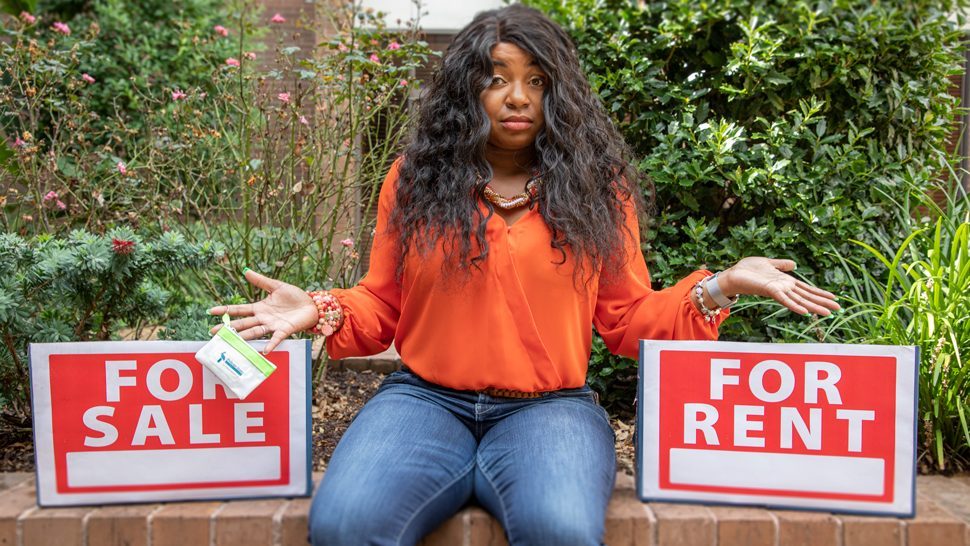Let’s face it—none of us are made of money. We don’t have a money tree in the back yard that we can simply go pick from when we’d like to buy something. While those things would be really cool, the reality is that we have budgets to stick to and have to carefully plan for life’s expenses.
We all eventually face having to make big decisions that have huge financial impacts. Going to college, buying a car, getting married—whatever it may be, these things cost money and lots of it!
Another example, one that we will extensively focus on here, is housing. Should you rent or should you own?
What to Do First
The first thing you should do when deciding whether to rent or own is to evaluate your financial situation and what your goals are. Your main objective before making the big decision should be to establish which option makes more financial sense and can benefit you the most.
Contrary to what you might think, owning is not the best option for everyone.
Let’s jump in and list the pros and cons for owning and the pros and cons for renting as well as break down everything you should consider in your decision-making process.
Pros and Cons of Owning
Buying a home could be the biggest and most important purchase you make in your life. You need to weigh all the advantages and disadvantages before choosing to become a home owner.
Pros
- Payments build equity
- Equity is simply the monetary value of your home minus the amount you still owe on it. As you make payments toward your home loan, its principal balance will decrease, thus increasing your equity. Over time, equity will inevitably build as long as you’re making your mortgage payments.
- Your place, your rules
- Who doesn’t like being their own boss? Owning a home grants you the freedom to do virtually anything you’d like to it (aside from Homeowner’s Association limitations). Whether it’s painting, having pets, installing security cameras, or landscaping, when you own your home, you can make it your own.
- Tax benefits
- A home mortgage can be costly depending on the interest rate that you receive. Those interest charges aren’t all bad, though. For homeowners that choose to itemize their deductions when filing taxes, they may be eligible to deduct their mortgage interest and property tax payments.
- Lower or comparable payments
- Results may vary as there are a lot of moving parts to mortgage payments. Your monthly payment would depend on the type of mortgage loan you get, how high or low of a rate you receive, the value and location of the home, and more. Generally speaking, a monthly mortgage payment could be the same or possibly even less than what you’d pay in rent.
Cons
- Property taxes
- Not many things in life are promised, but if you own property, you have to pay property taxes. Don’t stress too much, though! With most mortgages, property taxes are commonly held by the lender to pay in an account called “escrow,” so you won’t have to worry about forgetting to pay them.
Don't let all these mortgage terms confuse you!
Click here for all the mortgage terms and phrases you need to know when buying a home!- Stuck in the same house
- Because owning is such a big commitment, you’re financially “anchored down.” The ability to pack up and move a year after you’ve purchased a home would be quite the challenge. Choose wisely!
- Repairs and hidden costs
- Pest control, roof damage, appliances breaking—these are all things that you didn’t sign up for. Our best advice is to plan for the unexpected. Create an emergency savings account and start adding to it early. Imagine waking up in the morning, turning the water on for a shower, and the water being freezing cold. Your water heater is broken, and guess who has to foot the bill to have it repaired? That emergency savings account would fund scenarios like this.
Do you want to 'own' the home buying process?
We’ve created a checklist so you can start the path to homeownership one task at a time!Pros and Cons of Renting
For a lot of people, renting provides a significant feeling of freedom that they don’t get from home ownership. Some people don’t want to carry the financial responsibility of owning or just don’t want to feel attached to something. Trying to decide if renting is the right option for you? Let’s take a look at the pros and cons of renting.
Pros
- Freedom to move
- Most lease terms are usually only 12 months, allowing you to plan in advance if you know you will need to relocate down the road. Sometimes you may even find a month-to-month lease to be the best way to go if you have a job that requires you to constantly move. Your decision to rent is not as binding as owning when it comes to time.
- No maintenance costs
- Possibly the most popular advantage to renting is the fact that you don’t have to pay out of pocket if something breaks. The landlord is responsible for maintaining the property since they own it.
- Expenses included in rent
- In many cases, utilities like water and sewage that would be separate when owning a home are included in your monthly rent. The goal of the landlord is to provide convenience for the tenant while also maintaining control of the home. If the tenant’s only bill for the month is one lump sum for rent, both sides are happy.
Cons
- No equity with renting
- Unlike with mortgage payments, you don’t build equity with your rent payments. When you’ve made all the rent payments based on the lease you signed, that’s it. You don’t get anything back at the end of the lease term, except maybe your security deposit if applicable.
- Can’t make changes to the property
- You will need to follow the terms and conditions set forth on the lease agreement, which probably consists of the inability to make any modifications to the property. This includes getting new appliances, building a deck, painting the walls, and adding wood floors. Personalization is limited when renting.
- List of restrictions
- Some landlords have size limit rules for pets or even prohibit pets altogether. While this is a cleanliness precaution, it can be considered a liability precaution as well. If you have pets and plan to rent, be sure to go over the property’s rules and regulations before committing to a location. Other restrictions may include not hanging things on walls and no smoking.
There are many pros and cons to consider when buying or renting a home. After reviewing some of the ones we mention, you’ll be well on your way to making the decision for what best fits your needs and wants, lifestyle, and financial situation.
If you’re looking to purchase a home, meet with a Nationally Certified Credit Counselor to get prepared!
Do you prefer to rent or own? Let us know in the comments below!
Once a Pelican State CU member, always a member—through life’s milestones, we’ll always be there to help you with your financial needs. Your Financial Family for Life. Give us a call at 800-351-4877.



